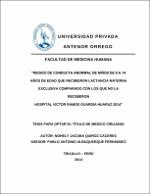| dc.contributor.advisor | Albuquerque Fernández, Pablo Antonio | |
| dc.contributor.author | Quiroz Cáceres, Nohely Jacoba | |
| dc.creator | Quiroz Cáceres, Nohely Jacoba | |
| dc.date.accessioned | 2014-11-22T17:05:25Z | |
| dc.date.available | 2014-11-22T17:05:25Z | |
| dc.date.issued | 2014 | |
| dc.identifier.uri | https://hdl.handle.net/20.500.12759/457 | |
| dc.description.abstract | Comparar el riesgo de conducta anormal en niños de 8 a 14 años que recibieron lactancia materna exclusiva con los que no la recibieron.
Diseño: Analítico .Observacional. Cohortes.
Ámbito de estudio: Hospital Huaraz MINSA-Perú. En los meses Enero - Febrero 2014.
Poblaciones:120 niños, 60 con lactancia materna exclusiva(LME) y 60 que no recibieron LME.
Medidas principales del seguimiento: Puntajes del score de MESSY.
Resultados Los niños que no recibieron LME tienen mayor riesgo de tener conducta anormal Chi cuadrado de Pearson=19.394 p=0.000 OR=5.571(2.531-12.267). Tanto en el puntaje total como en los dominios la media de los puntajes es mayor en el grupo LME , la diferencia de medias intergrupos es estadísticamente significativa. ANOVA intergrupos: Total: F=7.64,p=0.006 ;Habilidades sociales: F=11.069 p=0.001 Asertividad F= 16.812, p=0.000; Impulsividad F=15.003, p=0.000 : Sobreconfianza F=8.009 p=0.005, Celos-soledad F=10.699 p=0.001.No encontramos correlación significativa entre duración de LME y los puntajes total y por dimensiones del score de MESSY.
Conclusiones: Los niños que recibieron lactancia materna exclusiva tienen menor riesgo de presentar conducta anormal que los que no la recibieron. | es_PE |
| dc.description.abstract | To compare anormal behavior in children’s between 8 to 14
years exclusive breastfeeding a with no breast feeding.
Design: Prospective. Observational Analitic. Cohorts.
Setting: Huaraz’ Hospital – Perú In the months from January to February
2014.
Subjects: 120 children asignated to 2 cohorts 60 with and 60 without
antecedent exclusive breast feeding (EBF).
Main outcome measures: Score de MESSY
Results: The children who received no LME have higher risk of having
abnormal behavior Chi square Pearson = 19 394 p = 0.000 OR = 5 571 (2.531-
12.267).In the score of MESSY, both in the total score as domains in the
average scores is higher in the LME group, Middle Intergroup difference is
statistically significant. ANOVA intergroups: Total: F = 7.64, p = 0.006;
Social skills: F = 11.069 p = 0.001 assertiveness F = 16.812, p = 0.000;
Impulsivity F = 15.003, p = 0.000: freaking F = 8.009 p = 0.005, jealousysolitude
F = 10.699 p = 0.001. Not found significant correlation between
duration of LME and total scores and dimensions of the score of MESSY.
Conclusions: Children receiving exclusive breastfeeding have less risk of
developing abnormal behavior that they did not receive.
Key words :exclusive breastfeeding, anormal | en_US |
| dc.description.uri | Tesis | es_PE |
| dc.format | application/pdf | es_PE |
| dc.language.iso | spa | es_PE |
| dc.publisher | Universidad Privada Antenor Orrego - UPAO | es_PE |
| dc.rights | info:eu-repo/semantics/openAccess | es_PE |
| dc.source | Universidad Privada Antenor Orrego - UPAO | es_PE |
| dc.source | Repositorio institucional - UPAO | es_PE |
| dc.subject | Lactancia materna | es_PE |
| dc.subject | Conducta anormal | es_PE |
| dc.subject | Niños | es_PE |
| dc.title | Riesgo de conducta anormal de niños de 8 a 14 años de edad que recibieron lactancia materna exclusiva comparado con los que no la recibieron hospital Víctor Ramos Guardia Huaraz 2014 | es_PE |
| dc.type | info:eu-repo/semantics/bacherlorThesis | es_PE |
| thesis.degree.level | Titulo Profesional | es_PE |
| thesis.degree.grantor | Universidad Privada Antenor Orrego. Facultad de Medicina Humana | es_PE |
| thesis.degree.name | Medico Cirujano | es_PE |
| thesis.degree.discipline | Medicina | es_PE |

